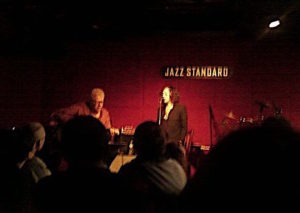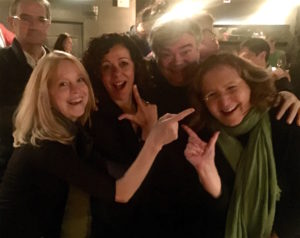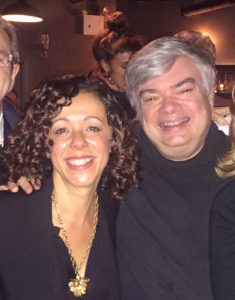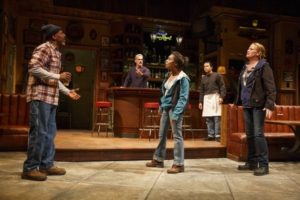 The Bill Evans Trio plays Thelonious Monk’s “Round Midnight” on Swedish TV in 1970. Eddie Gomez is the bassist, Marty Morell the drummer:
The Bill Evans Trio plays Thelonious Monk’s “Round Midnight” on Swedish TV in 1970. Eddie Gomez is the bassist, Marty Morell the drummer:
(This is the latest in a series of arts-related videos that appear in this space each Monday, Wednesday, and Friday)



 Luciana Souza and I go back a long time. The
Luciana Souza and I go back a long time. The  Listening to Brazilian Duos heightened my interest in Brazilian jazz and popular music, which I already loved but about which I as yet knew comparatively little. A year after I profiled Lu for the Times, I
Listening to Brazilian Duos heightened my interest in Brazilian jazz and popular music, which I already loved but about which I as yet knew comparatively little. A year after I profiled Lu for the Times, I  For all these reasons, my wife and I rejoiced greatly when we heard that Lu would be playing a two-nighter at the
For all these reasons, my wife and I rejoiced greatly when we heard that Lu would be playing a two-nighter at the  Lu came straight to our table when the set was over, and there was much hugging and laughter. A crowded nightclub is no place for quiet reminiscence, but there was no need for that. Something that I’ve noticed about jazz musicians is that they never have any trouble renewing a friendship after a long separation. Accustomed as they are to the rigors of life on the road, they simply pick up where they left off. That was what happened to us: Lu, Maria, Lúcia and I behaved as though we’d seen one another the day before, and Mrs. T fit in as easily as the missing piece of a puzzle.
Lu came straight to our table when the set was over, and there was much hugging and laughter. A crowded nightclub is no place for quiet reminiscence, but there was no need for that. Something that I’ve noticed about jazz musicians is that they never have any trouble renewing a friendship after a long separation. Accustomed as they are to the rigors of life on the road, they simply pick up where they left off. That was what happened to us: Lu, Maria, Lúcia and I behaved as though we’d seen one another the day before, and Mrs. T fit in as easily as the missing piece of a puzzle. Ms. Souza connects her own stylistic openness to the fact that she comes from so diverse a country. “In Brazil,” she said, “everything is so—is permissible the correct word? Anything can happen, and it’s exciting that way. I could be half-black, as I am, and go to Jewish schools for 10 years, as I did. It has to do with the nature of Brazilian colonization. You know, the Portuguese came to Brazil some 500 years ago, found the native Indians living there, and then they brought Africans from Africa for another 350 years. People really mixed—the music, the culture, the skin color.”
Ms. Souza connects her own stylistic openness to the fact that she comes from so diverse a country. “In Brazil,” she said, “everything is so—is permissible the correct word? Anything can happen, and it’s exciting that way. I could be half-black, as I am, and go to Jewish schools for 10 years, as I did. It has to do with the nature of Brazilian colonization. You know, the Portuguese came to Brazil some 500 years ago, found the native Indians living there, and then they brought Africans from Africa for another 350 years. People really mixed—the music, the culture, the skin color.” The Public’s production of “Sweat” is a remount of Kate Whoriskey’s fire-eating Oregon production, which subsequently transferred to the Arena Stage in Washington, D.C. The cast has changed, in all cases for the better—the stylistic unanimity of Ms. Whoriskey’s new ensemble of actors is awe-inspiring—but the play itself, which mostly takes place in a blue-collar bar in Reading, is substantially the same one I saw in Oregon. It is the story of a group of striking workers whose employers, motivated by the North American Free Trade Agreement, are moving their plant to Mexico. The workers are terrified, not just because they’re out of work (or about to be) but because their jobs are their lives, a fundamental source of their personal identity. Without jobs, who are they—and what will they become?…
The Public’s production of “Sweat” is a remount of Kate Whoriskey’s fire-eating Oregon production, which subsequently transferred to the Arena Stage in Washington, D.C. The cast has changed, in all cases for the better—the stylistic unanimity of Ms. Whoriskey’s new ensemble of actors is awe-inspiring—but the play itself, which mostly takes place in a blue-collar bar in Reading, is substantially the same one I saw in Oregon. It is the story of a group of striking workers whose employers, motivated by the North American Free Trade Agreement, are moving their plant to Mexico. The workers are terrified, not just because they’re out of work (or about to be) but because their jobs are their lives, a fundamental source of their personal identity. Without jobs, who are they—and what will they become?…